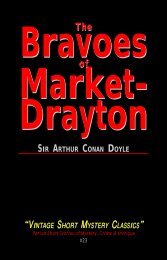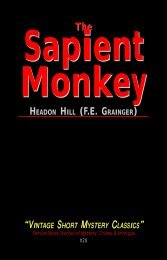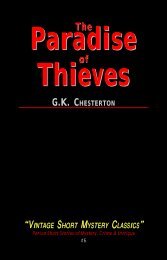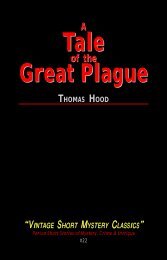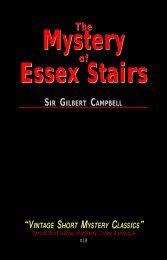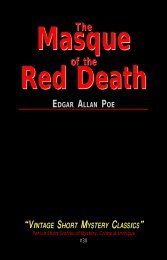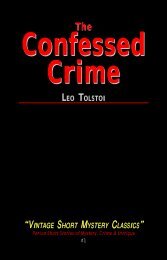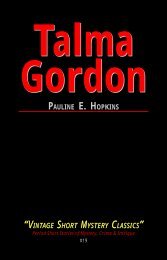Thrawn Janet - Hornpipe Vintage Publications
Thrawn Janet - Hornpipe Vintage Publications
Thrawn Janet - Hornpipe Vintage Publications
You also want an ePaper? Increase the reach of your titles
YUMPU automatically turns print PDFs into web optimized ePapers that Google loves.
<strong>Thrawn</strong><br />
<strong>Janet</strong><br />
ROBERT LOUIS STEVENSON<br />
“VINTAGE SHORT MYSTERY CLASSICS”<br />
Period Short Stories of Mystery, Crime & Intrigue<br />
#21
All short stories in the “<strong>Vintage</strong> Short Mystery Classics” series are<br />
period works now in the public domain. These e-book presentations<br />
are published by:<br />
<strong>Hornpipe</strong> <strong>Vintage</strong> <strong>Publications</strong><br />
P.O. Box 18428<br />
Spartanburg, SC 29318<br />
www.hornpipe.com/mysclas.htm<br />
“<strong>Vintage</strong> Short Mystery Classics” have been selected by Daniel Elton<br />
Harmon, author of “The Harper Chronicles,” with the intent of introducing<br />
new readers to notable works of short historical fiction in<br />
the mystery/gothic/crime vein. For more information, please visit the<br />
author’s Web site at www.danieleltonharmon.com.<br />
To some, antiquarian Scots dialect reads annoyingly if not unbearably.<br />
To others, hopefully, it lends a heightened flavor to a story and setting.<br />
Here, you’ll receive a hardy excercise in linguistic deciphering.<br />
Robert Louis Stevenson (1850-94) is most famous for his novels of<br />
buried treasure and buccaneering on the high seas—and for his horror<br />
classic of Jekyll and Hyde. But he also wrote notable travel accounts,<br />
poems and, as you’ll discover in “<strong>Thrawn</strong> <strong>Janet</strong>,” riveting short fiction.<br />
It’s from The Merry Men and Other Tales and Fables (1887).<br />
—DEH
<strong>Thrawn</strong> <strong>Janet</strong><br />
The Reverend Murdoch Soulis was long minister of<br />
the moorland parish of Balweary, in the vale of<br />
Dule. A severe, bleak-faced old man, dreadful to<br />
his hearers, he dwelt in the last years of his life, without<br />
relative or servant or any human company, in the small<br />
and lonely manse under the Hanging Shaw. In spite of<br />
the iron composure of his features, his eye was wild, scared,<br />
and uncertain; and when he dwelt, in private admonition,<br />
on the future of the impenitent, it seemed as if his<br />
eye pierced through the storms of time to the terrors of<br />
eternity. Many young persons, coming to prepare themselves<br />
against the season of the Holy Communion, were<br />
dreadfully affected by his talk. He had a sermon on 1st<br />
Peter, v. and 8th, “The devil as a roaring lion,” on the<br />
Sunday after every seventeenth of August, and he was accustomed<br />
to surpass himself upon that text both by the<br />
appalling nature of the matter and the terror of his bearing<br />
in the pulpit. The children were frightened into fits,<br />
and the old looked more than usually oracular, and were,<br />
all that day, full of those hints that Hamlet deprecated.<br />
The manse itself, where it stood by the water of Dule<br />
among some thick trees, with the Shaw overhanging on<br />
the one side, and on the other many cold, moorish hilltops<br />
rising toward the sky, had begun, at a very early period<br />
of Mr. Soulis’s ministry, to be avoided in the dusk<br />
hours by all who valued themselves upon their prudence;<br />
and guidmen sitting at the clachan alehouse shook their<br />
heads together at the thought of passing late by that un-
2 <strong>Thrawn</strong> <strong>Janet</strong><br />
canny neighbourhood. There was one spot, to be more<br />
particular, which was regarded with especial awe. The<br />
manse stood between the highroad and the water of Dule,<br />
with a gable to each; its back was towards the kirktown of<br />
Balweary, nearly half a mile away; in front of it, a bare<br />
garden, hedged with thorn, occupied the land between<br />
the river and the road. The house was two stories high,<br />
with two large rooms on each. It opened not directly on<br />
the garden but on a causewayed path, or passage, giving<br />
on the road on the one hand, and closed on the other by<br />
the tall willows and elders that bordered on the stream.<br />
And it was this strip of causeway that enjoyed among the<br />
young parishioners of Balweary so infamous a reputation.<br />
The minister walked there often after dark, sometimes<br />
groaning aloud in the instancy of his unspoken prayers;<br />
and when he was from home, and the manse door was<br />
locked, the more daring schoolboys ventured, with beating<br />
hearts, to “follow my leader” across that legendary<br />
spot.<br />
This atmosphere of terror, surrounding, as it did, a<br />
man of God of spotless character and orthodoxy, was a<br />
common cause of wonder and subject of enquiry among<br />
the few strangers who were led by chance or business into<br />
that unknown, outlying country. But many even of the<br />
people of the parish were ignorant of the strange events<br />
which had marked the first year of Mr. Soulis’s ministrations;<br />
and among those who were better informed, some<br />
were naturally reticent, and others shy of that particular<br />
topic. Now and again, only one of the older folk would<br />
warm into courage over his third tumbler, and recount<br />
the cause of the minister’s strange looks and solitary life.
<strong>Thrawn</strong> <strong>Janet</strong> 3<br />
FIFTY YEARS SYNE, when Mr. Soulis cam’ first into Ba’weary,<br />
he was still a young man—a callant, the folk said—fu’ o’<br />
book-learnin’ an’ grand at the exposition, but, as was<br />
natural in sae young a man, wi’ nae leevin’ experience in<br />
religion. The younger sort were greatly taken wi’ his gifts<br />
and his gab; but auld, concerned, serious men and<br />
women were moved even to prayer for the young man,<br />
whom they took to be a self-deceiver, and the parish that<br />
was like to be sae ill-supplied. It was before the days o’<br />
the moderates—weary fa’ them; but ill things are like<br />
guid—they baith come bit by bit, a pickle at a time;<br />
and there were folk even then that said the Lord had left<br />
the college professors to their ain devices, an’ the lads<br />
that went to study wi’ them wad hae done mair an’ better<br />
sittin’ in a peat-bog, like their forbears of the persecution,<br />
wi’ a Bible under their oxter an’ a speerit o’ prayer<br />
in their hearts. There was nae doubt onyway, but that<br />
Mr. Soulis had been ower lang at the college. He was<br />
careful and troubled for mony things besides the ae thing<br />
needful. He had a feck o’ books wi’ him—mair than had<br />
ever been seen before in a’ that presbytery; and a sair<br />
wark the carrier had wi’ them, for they were a’ like to<br />
have smoored in the De’il’s Hag between this and<br />
Kilmackerlie. They were books o’ divinity, to be sure, or<br />
so they ca’d them; but the serious were o’ opinion there<br />
was little service for sae money, when the hail o’ God’s<br />
Word would gang in the neuk o’ a plaid. Then he wad<br />
sit half the day and half the nicht forbye, which was<br />
scant decent—writin’ nae less; an’ first they were feared<br />
he wad read his sermons; an’ syne it proved he was writin’<br />
a book himsel’, which was surely no’ fittin’ for ane o’ his<br />
years an’ sma’ experience.
4 <strong>Thrawn</strong> <strong>Janet</strong><br />
Onyway it behoved him to get an auld, decent wife<br />
to keep the manse for him an’ see to his bit denners; an’<br />
he was recommended to an auld limmer—<strong>Janet</strong> M’Clour,<br />
they ca’d her—an’ sae far left to himsel’ as to be ower<br />
persuaded. There was mony advised him to the contrar,<br />
for <strong>Janet</strong> was mair than suspeckit by the best folk in<br />
Ba’weary. Lang or that, she had had a wean to a dragoon;<br />
she hadna come forrit for maybe thretty year; and bairns<br />
had seen her mumblin’ to hersel’ up on Key’s Loan in the<br />
gloamin’, whilk was an unco time an’ place for a Godfearin’<br />
woman. Howsoever, it was the laird himsel’ that<br />
had first tauld the minister o’ <strong>Janet</strong>; an’ in thae days he<br />
wad hae gane a far gate to pleesure the laird. When folk<br />
tauld him that <strong>Janet</strong> was sib to the de’il, it was a’ superstition<br />
by his way o’ it; an’ when they cast up the Bible to<br />
him an’ the witch of Endor, he wad threep it doun their<br />
trapples that thir days were a’ gane by, an’ the de’il was<br />
mercifully restrained.<br />
Weel, when it got about the clachan that <strong>Janet</strong><br />
M’Clour was to be servant at the manse, the folk were fair<br />
mad wi’ her an’ him thegither; an’ some o’ the guidwives<br />
had nae better to dae then get round her door-cheeks and<br />
chairge her wi’ a’ that was ken’t again’ her, fre the sodger’s<br />
bairn to John Tamson’s twa kye. She was nae great speaker;<br />
folk usually let her gang her ain gate, an’ she let them<br />
gang theirs, wi’ neither Fair-guid-een nor Fair-guid-day;<br />
but when she buckled to, she had a tongue to deave the<br />
miller. Up she got, an’ there wasna an auld story in Ba’weary<br />
but she gart somebody lowp for it that day; they couldna<br />
say ae thing but she could say twa to it; till, at the hinder<br />
end, the guidwives up an’ claught haud of her, an’ clawed<br />
the coats aff her back, and pu’d her doun the clachan to
<strong>Thrawn</strong> <strong>Janet</strong> 5<br />
the water o’ Dule, to see if she were a witch or no, soom or<br />
droun. The carline skirled till ye could hear her at the<br />
Hangin’ Shaw, an’ she focht like ten; there was mony a<br />
guidwife bore the mark o’ her neist day an’ mony a lang<br />
day after; an’ just in the hettest o’ the collieshangie, wha<br />
suld come up (for his sins) but the new minister!<br />
“Women,” said he (an’ he had a grand voice), “I charge<br />
you in the Lord’s name to let her go.”<br />
<strong>Janet</strong> ran to him—she was fair wud wi’ terror—an’<br />
clang to him, an’ prayed him, for Christ’s sake, save her<br />
frae the cummers; an’ they, for their part, tauld him a’<br />
that was ken’t, an’ maybe mair.<br />
“Woman,” says he to <strong>Janet</strong>, “is that true?”<br />
“As the Lord sees me,” says she, “as the Lord made<br />
me, no’ a word o’t. Forbye the bairn,” says she, “I’ve been<br />
a decent woman a’ my days.”<br />
“Will you,” says Mr. Soulis, “in the name of God,<br />
and before me, His unworthy minister, renounce the devil<br />
and his works?”<br />
Weel, it wad appear that when he askit that, she gave<br />
a girn that fairly frichit them that saw her, an’ they could<br />
hear her teeth play dirl thegither in her chafts; but there<br />
was naething for it but the ae way or the ither; an’ <strong>Janet</strong><br />
lifted up her hand an’ renounced the de’il before them a’.<br />
“And now,” says Mr. Soulis to the guidwives, “home<br />
with ye, one and all, and pray to God for His forgiveness.”<br />
An’ he gied <strong>Janet</strong> his arm, though she had little on<br />
her but a sark, and took her up to the clachan to her ain<br />
door like a leddy o’ the land; an’ her screighin’ an’ laughin’<br />
as was a scandal to be heard.<br />
There were mony grave folk lang ower their prayers<br />
that nicht; but when the morn cam’ there was sic a fear
6 <strong>Thrawn</strong> <strong>Janet</strong><br />
fell upon a’ Ba’weary that the bairns hid theirsels, an’<br />
even the men-folk stood an’ keekit frae their doors. For<br />
there was <strong>Janet</strong> comin’ doun the clachan—her or her<br />
likeness, nane could tell—wi’ her neck thrawn, an’ her<br />
heid on ae side, like a body that has been hangit, an’ a<br />
grin on her face like an unstreakit corp. By an’ by they<br />
got used wi’ it, an’ even speered at her to ken what was<br />
wrang; but frae that day forth she couldna speak like a<br />
Christian woman, but slavered an’ played click wi’ her<br />
teeth like a pair o’ shears; an’ frae that day forth the<br />
name o’ God cam’ never on her lips. Whiles she wad try<br />
to say it, but it michtna be. Them that kenned best said<br />
least; but they never geid that Thing the name o’ <strong>Janet</strong><br />
M’Clour; for the auld <strong>Janet</strong>, by their way o’t, was in<br />
muckle hell that day. But the minister was neither to<br />
haud nor to bind; he preached about naething but the<br />
folk’s cruelty that had gi’en her a stroke of the palsy; he<br />
skelpit the bairns that meddled her; an’ he had her up to<br />
the manse that same nicht, an’ dwalled there a’ his line<br />
wi’ her under the Hangin’ Shaw.<br />
Weel, time gaed by: and the idler sort commenced<br />
to think mair lichtly o’ that black business. The minister<br />
was well thought o’; he was aye late at the writing, folk<br />
wad see his can’le doon by the Dule water after twal’ at<br />
e’en; and he seemed pleased wi’ himsel’ an’ upsitten as at<br />
first, though a’ body could see that he was dwining. As for<br />
<strong>Janet</strong> she cam’ an’ she gaed; if she didna speak muckle<br />
afore, it was reason she should speak less then; she meddled<br />
naebody; but she was an eldritch thing to see, an’ nane<br />
wad hae mistrysted wi’ her for Ba’weary glebe.<br />
About the end o’ July there cam’ a spell o’ weather,<br />
the like o’t never was in that country-side; it was lown an’
<strong>Thrawn</strong> <strong>Janet</strong> 7<br />
het an’ heartless; the herds couldna win up the Black Hill,<br />
the bairns were ower weariet to play; an’ yet it was gousty<br />
too, wi’ claps o’ het wund that rumm’led in the glens,<br />
and bits o’ shouers that slockened naething. We aye thocht<br />
it büt to thun’er on the morn; but the morn cam’, an’ the<br />
morn’s morning, an’ it was aye the same uncanny weather,<br />
sair on folks and bestial. O’ a’ that were the waur, nane<br />
suffered like Mr. Soulis; he could neither sleep nor eat, he<br />
tauld his elders; an’ when he wasna writin’ at his weary<br />
book, he wad be stravaguin’ ower a’ the country-side like<br />
a man possessed, when a’ body else was blithe to keep<br />
caller ben the house.<br />
Abune Hangin’ Shaw, in the bield o’ the Black Hill,<br />
there’s a bit enclosed ground wi’ an iron yett; an’ it seems,<br />
in the auld days, that was the kirkyard o’ Ba’weary, an’<br />
consecrated by the Papists before the blessed licht shone<br />
upon the kingdom. It was a great howff, o’ Mr. Soulis’s<br />
onyway; there he wad sit an’ consider his sermons; an’<br />
indeed it’s a bieldy bit. Weel, as he cam’ ower the wast<br />
end o’ the Black Hill, ae day, he saw first twa, an’ syne<br />
fower, an’ syne seeven corbie craws fleein’ round an’ round<br />
abune the auld kirkyard. They flew laigh an’ heavy, an’<br />
squawked to ither as they gaed; an’ it was clear to Mr.<br />
Soulis that something had put them frae their ordinar.<br />
He wasna easy fleyed, an’ gaed straucht up to the wa’s; an’<br />
what suld he find there but a man, or the appearance o’ a<br />
man, sittin’ in the inside upon a grave. He was of a great<br />
stature, an’ black as hell, and his e’en were singular to see.<br />
Mr. Soulis had heard tell o’ black men, mony’s the time;<br />
but there was something unco about this black man that<br />
daunted him. Het as he was, he took a kind o’ cauld grue<br />
in the marrow o’ his banes; but up he spak for a’ that; an’
8 <strong>Thrawn</strong> <strong>Janet</strong><br />
says he: “My friend, are you a stranger in this place?” The<br />
black man answered never a word; he got upon his feet,<br />
an’ begoud on to hirsle to the wa’ on the far side; but he<br />
aye lookit at the minister; an’ the minister stood an’ lookit<br />
back; till a’ in a meenit the black man was ower the wa’<br />
an’ rinnin’ for the bield o’ the trees. Mr. Soulis, he hardly<br />
kenned why, ran after him; but he was fair forjeskit wi’ his<br />
walk an’ the het, unhalesome weather; an’ rin as he likit,<br />
he got nae mair than a glisk o’ the black man amang the<br />
birks, till he won doun to the foot o’ the hillside, an’ there<br />
he saw him ance mair, gaun, hap-step-an’-lawn, ower Dule<br />
water to the manse.<br />
Mr. Soulis wasna pleased that this fearsome gangrel<br />
suld mak’ sae free wi’ Ba’weary manse; an’ he ran the harder,<br />
an’, wet shoon, ower the burn, an’ up the walk; but the<br />
de’il a black man was there to see. He stepped out upon<br />
the road, but there was naebody there; he gaed a’ ower<br />
the gairden, but na, nae black man. At the hinder end,<br />
an’ a bit feared as was but natural, he lifted the hasp an’<br />
into the manse; and there was <strong>Janet</strong> M’Clour before his<br />
e’en, wi’ her thrawn craig, an’ nane sae pleased to see him.<br />
An’ he aye minded sinsyne, when first he set his e’en upon<br />
her, he had the same cauld and deidly grue.<br />
“<strong>Janet</strong>,” says he, “have you seen a black man?”<br />
“A black man!” quo’ she. “Save us a’! Ye’re no wise,<br />
minister. There’s nae black man in a’ Ba’weary.”<br />
But she didna speak plain, ye maun understand; but<br />
yam-yammered, like a powney wi’ the bit in its moo.<br />
“Weel,” says he, “<strong>Janet</strong>, if there was na black man, I<br />
have spoken with the Acuser of the Brethren.”<br />
An’ he sat doun like ane wi’ a fever, an’ his teeth<br />
chittered in his heid.
<strong>Thrawn</strong> <strong>Janet</strong> 9<br />
“Hoots,” says she, “think shame to yoursel’, minister”;<br />
an’ gied him a drap brandy that she keept aye by her.<br />
Syne Mr. Soulis gaed into his study amang a’ his<br />
books. It’s a lang, laigh, mirk chalmer, perishin’ cauld in<br />
winter, an’ no’ very dry even in the top o’ the simmer, for<br />
the manse stands near the burn. Sae doun he sat, and<br />
thocht of a’ that had come an’ gane since he was in<br />
Ba’weary, an’ his hame, a’ the days when he was a bairn<br />
an’ ran daffin’ on the braes; an’ that black man aye ran in<br />
his heid like the owercome of a sang. Aye the mair he<br />
thocht, the mair he thocht o’ the black man. He tried the<br />
prayer, an’ the words wouldna come to him; an’ he tried,<br />
they say, to write at his book, but he couldna mak’ mair o’<br />
that. There was whiles he thocht the black man was at his<br />
oxter, an’ the swat stood upon him cauld as well-water;<br />
and there was ither whiles, when he cam’ to himsel’ like a<br />
christened bairn an’ minded naething.<br />
The upshot was that he gaed to the window an’ stood<br />
glowrin’ at Dule water. The trees are unco thick, an’ the<br />
water lies deep an’ black under the manse; an’ there was<br />
<strong>Janet</strong> washin’ the cla’es wi’ her coats kilted. She had her<br />
back to the minister, an’ he, for his pairt, hardly kenned<br />
what he was lookin’ at. Syne she turned round, an’ shawed<br />
her face; Mr. Soulis had the same cauld grue as twice that<br />
day afore, an’ it was borne in upon him what folk said,<br />
that <strong>Janet</strong> was died lang syne, an’ this was a bogle in her<br />
clay-cauld flesh. He drew back a pickle and he scanned<br />
her narrowly. She was tramp-trampin’ in the cla’es croonin’<br />
to hersel’; and eh! Gude guide us, but it was a fearsome<br />
face. Whiles she sang louder, but there was nae man born<br />
o’ woman that could tell the words o’ her sang; an’ whiles<br />
she lookit side-land doun, but there was naething there
10 <strong>Thrawn</strong> <strong>Janet</strong><br />
for her to look at. There gaed a scunner through the flesh<br />
upon his banes; an’ that was Heeven’s advertisement. But<br />
Mr. Soulis just blamed himsel’, he said, to think sae ill o’<br />
a puir, auld afflicted wife that hadna a freend forbye<br />
himsel’; an’ he put up a bit prayer for him an’ her, an’<br />
drank a little caller water—for his heart rose again’ the<br />
meat—an’ gaed up to his naked bed in the gloamin’.<br />
That was a nicht that has never been forgotten in<br />
Ba’weary, the night o’ the seeventeenth o’ August,<br />
seeventeen hun’er’ an’ twal’. It had been het afore, as I hae<br />
said, but that nicht it w as hetter than ever. The sun gaed<br />
doun amang unco-lookin’ clouds; it fell as mirk as the pit;<br />
no’ a star, no’ a breath o’ wund; ye couldna see your han’<br />
afore your face, an even the auld folk cuist the covers frae<br />
their beds a’ lay pechin’ for their breath. Wi’ a’ that he<br />
had upon his mind, it was gey an’ unlikely Mr. Soulis<br />
wad get muckle sleep. He lay an’ he tummled; the gude,<br />
caller bed that he got into brunt his very banes; whiles he<br />
slept, an’ whiles he waukened; whiles he heard the time o’<br />
night, an’ whiles a tyke yowlin’ up the muir, as if somebody<br />
was deid; whiles he thocht he heard bogles claverin’<br />
in his lug, an’ whiles he saw spunkies in the room. He<br />
behooved, he judged, to be sick; an’ sick he was—little he<br />
jaloosed the sickness.<br />
At the hinder end, he got a clearness in his mind, sat<br />
up in his sark on the bed-side, an’ fell thinkin’ ance mair<br />
o’ the black man an’ <strong>Janet</strong>. He couldna weel tell how—<br />
maybe it was the cauld to his feet—but it cam’ in upon<br />
him wi’ a spate that there was some connection between<br />
thir twa, an’ that either or baith o’ them were bogles. An’<br />
just at that moment, in <strong>Janet</strong>’s room, which was neist to<br />
his, there cam’ a stramp o’ feet as if men were wars’lin’, an’
<strong>Thrawn</strong> <strong>Janet</strong> 11<br />
then a loud bang; an’ then a wund gaed reishling round<br />
the fower quarters o’ the house; an’ then a’ was ance mair<br />
as seelent as the grave.<br />
Mr. Soulis was feared for neither man nor de’il. He<br />
got his tinder-box, an’ lit a can’le, an’ made three steps o’t<br />
ower to <strong>Janet</strong>’s door. It was on the hasp, an’ he pushed it<br />
open, an’ keeked bauldly in. It was a big room, as big as<br />
the minister’s ain, an’ plenished wi’ grand, auld solid gear,<br />
for he had naething else. There was a fower-posted bed<br />
wi’ auld tapestry; an’ a braw cabinet o’ aik, that was fu’ o’<br />
the minister’s divinity books, an’ put there to be out o’<br />
the gate; an’ a wheen duds o’ <strong>Janet</strong>’s lying here an’ there<br />
about the floor. But nae <strong>Janet</strong> could Mr. Soulis see; nor<br />
ony sign o’ a contention. In he gaed (an’ there’s few that<br />
wad hae followed him) an’ lookit a’ round, an’ listened.<br />
But there was naething to be heard, neither inside the<br />
manse nor in a’ Ba’weary parish, an’ naething to be seen<br />
but the muckle shadows turnin’ round the can’le. An’ then,<br />
a’ at aince, the minister’s heart played dunt a’ stood stockstill;<br />
an’ a cauld wund blew amang the hairs o’ his heid.<br />
Whaten a weary sicht was that for the puir man’s e’en! For<br />
there was <strong>Janet</strong> hangin’ frae a nail beside the auld aik cabinet:<br />
her heid aye lay on her shouther, her e’en were steekit,<br />
the tongue projected frae her mouth, an’ her heels wer<br />
twa feet clear abune the floor.<br />
“God forgive us all!” thocht Mr. Soulis, “poor <strong>Janet</strong>’s dead.”<br />
He cam’ a step nearer to the corp; an’ then his heart<br />
fair whammled in his inside. For by what cantrip it wad<br />
ill beseem a man to judge, she was hangin’ frae a single<br />
nail an’ by a single wursted thread for darnin’ hose.<br />
It’s a awfu’ thing to be your lane at nicht wi’ siccan<br />
prodigies o’ darkness; but Mr. Soulis was strong in the
12 <strong>Thrawn</strong> <strong>Janet</strong><br />
Lord. He turned an’ gaed his ways oot o’ that room, an’<br />
lookit the door ahint him; an’ step by step, doun the stairs,<br />
as heavy as leed; and set doun the can’le on the table at<br />
the stairfoot. He couldna pray, he couldna think, he was<br />
dreepin’ wi’ caul’ swat, an’ naething could he hear but<br />
the dunt-dunt-duntin’ o’ his ain heart. He micht maybe<br />
hae stood there an hour, or maybe twa, he minded sae<br />
little; when a’ o’ a sudden, he heard a laigh, uncanny<br />
steer upstairs; a foot gaed to an’ fro in the chalmer whaur<br />
the corp was hangin’; syne the door was opened, though<br />
he minded weel that he had lockit it; an’ syne there was<br />
a step upon the landin’, an’ it seemed to him as if the<br />
corp was lookin’ ower the rail and down upon him whaur<br />
he stood.<br />
He took up the can’le again (for he couldna want the<br />
licht), an’ as saftly as ever he could, gaed straucht out o’<br />
the manse an’ to the far end o’ the causeway. It was aye<br />
pit-mirk; the flame o’ the can’le, when he set it on the<br />
grund, burnt steedy and clear as in a room; naething<br />
moved, but the Dule water seepin’ and sabbin’ doun the<br />
glen, an’ yon unhaly footstep that cam’ ploddin’ doun the<br />
stairs inside the manse. He kenned the foot ower weel,<br />
for it was <strong>Janet</strong>’s; an’ at ilka step that cam’ a wee thing<br />
nearer, the cauld got deeper in his vitals. He commended<br />
his soul to Him that made an’ keepit him; “and, O<br />
Lord,” said he, “give me strength this night to war against<br />
the powers of evil.”<br />
By this time the foot was comin’ through the passage<br />
for the door; he could hear a hand skirt alang the wa’,<br />
as if the fearsome thing was feelin’ for its way. The saughs<br />
tossed an’ maned thegither, a long sigh cam’ ower the<br />
hills, the flame o’ the can’le was blawn aboot; an’ there
<strong>Thrawn</strong> <strong>Janet</strong> 13<br />
stood the corp of <strong>Thrawn</strong> <strong>Janet</strong>, wi’ her grogram goun an’<br />
her black mutch, wi’ the heid aye upon the shouther, an’<br />
the girn still upon the face o’t—leevin’, ye wad hae said—<br />
died, as Mr. Soulis weel kenned—upon the threshold o’<br />
the manse.<br />
It’s a strange thing that the soul of a man should be<br />
that thirled into his perishable body; but the minister<br />
saw that, an’ his heart didna break.<br />
She didna stand there lang; she began to move again<br />
an’ cam’ slowly towards Mr. Soulis whaur he stood under<br />
the saughs. A’ the life o’ his body, a’ the strength o’ his<br />
speerit, were glowerin’ frae his e’en. It seemed she was<br />
gaun to speak, but wanted words, an’ made a sign wi’ the<br />
left hand. There cam’ a clap o’ wund, like a cat’s fuff; oot<br />
gaed the can’le, the saughs skreighed like folk; an’ Mr.<br />
Soulis kenned that, live or die, this was the end o’t.<br />
“Witch, beldame, devil!” he cried, “I charge you, by<br />
the power of God, begone—if you be dead, to the grave—<br />
if you be damned, to hell.”<br />
An’ at that moment the Lord’s ain hand out o’ the<br />
Heevens struck the Horror whaur it stood; the auld, deid,<br />
descrated corp o’ the witch-wife, sae lang keepit frae the<br />
grave and hirsled round by de’ils, lowed up like a brunstane<br />
spunk an’ fell in ashes to the ground; the thunder followed,<br />
peal on dirlin’ peal, the rarin’ rain upon the back<br />
o’ that; and Mr. Soulis lowped through the garden hedge,<br />
an’ ran, wi’ skelloch upon skelloch, for the clachan.<br />
That same mornin’, John Christie saw the Black Man<br />
pass the Muckle Cairn as it was chappin’ six; before eicht,<br />
he gaed by the change-house at Knockdow; an’ no’ lang<br />
after, Sandy M’Lellan saw him gaun linkin’ doun the braes<br />
frae Kilmackerlie. There’s little doubt but it was him that
14 <strong>Thrawn</strong> <strong>Janet</strong><br />
dwalled sae lang in <strong>Janet</strong>’s body; but he was awa’ at last;<br />
an’ sinsyne the de’il has never fashed us in Ba’weary.<br />
But it was a sair dispensation for the minister; lang,<br />
lang he lay ravin’ in his bed; an’ frae that hour to this, he<br />
was the man ye ken the day.<br />
—ROBERT LOUIS STEVENSON
Dabbling in Mystery. . . .<br />
Have a hankering to explain the hitherto unexplained?<br />
Curious about the lives of noted mystery<br />
authors? Intrigued by their fabricated puzzles<br />
—and by real-life enigmas?<br />
Join author Daniel Elton Harmon on the Internet<br />
in wide-ranging discourses on historical riddles,<br />
unique crimes, the supernatural and the starkly<br />
odd. “Mysterious Expeditions” presents notes and<br />
commentaries on true mysteries as well as vintage<br />
mystery authors and their works. AND . . . you’re<br />
encouraged to contribute your own findings! Pay<br />
a call to this exciting new historical mystery blog:<br />
http://mysteriousexpeditions.blogspot.com.<br />
South Carolina author and editor Daniel Elton Harmon has written<br />
more than fifty books. Recently published by Chelsea House are his six<br />
volumes in the “Exploration of Africa: The Emerging Nations” series;<br />
The Titanic, part of the “Great Disasters: Reforms and Ramifications”<br />
series; his history of the Hudson River for the “Rivers in American Life<br />
and Times” series; and juvenile biographies in the “Explorers of New<br />
Worlds” series. Other of his books are published by Wright/McGraw-<br />
Hill, Mason Crest and Barbour Publishing. His freelance articles have<br />
appeared in such periodicals as Nautilus, Music Journal and The New York<br />
Times. Harmon is the associate editor of Sandlapper: The Magazine of<br />
South Carolina and editor of The Lawyer’s PC, a technology newsletter.<br />
The Chalk Town Train & Other Tales: “The Harper Chronicles,” Volume<br />
One is his first book of fiction and the first of his series of short story<br />
collections that follow the career of Harper the crime reporter.
Harper is at the scene. . . .<br />
Six unmarked graves hold the secret<br />
to an older generation’s hideous ordeal.<br />
. . .<br />
Escaped convicts invade a riverside<br />
campsite. . . .<br />
A ring of prestigious businessmen<br />
carry out a massive estate swindle in<br />
the state capital. . . .<br />
Shipwreck survivors sheltered at a<br />
Low Country fishing village have<br />
much, much to hide. . . .<br />
And the president of the United States turns to a small-city<br />
journalist to intercept a potentially disastrous item of diplomatic<br />
correspondence. . . .<br />
Harper, nonconformist crime reporter for the fledgling Challenge,<br />
finds himself in the thick of these and other dramas in the<br />
post-Reconstruction South. Through intuition, deduction, focused<br />
research and on-the-scene investigation, Harper probes to the<br />
heart of each affair. In the process, he often uncovers facts and<br />
circumstances he can never publish—and enters the hazy borderland<br />
between observer and participant.<br />
The Chalk Town Train & Other Tales, Daniel Elton Harmon’s first<br />
volume of “Harper” short stories, has received rave reviews in<br />
history/mystery circles and is available in print. Visit<br />
www.danieleltonharmon.com to learn more about this exciting<br />
new series and read what the critics are saying!<br />
An author-signed copy of The Chalk Town Train & Other Tales<br />
(softbound, 157 pages) costs $15 postpaid. Please make check or<br />
money order payable to “Dan Harmon” and mail to the author at<br />
P.O. Box 18428, Spartanburg, SC 29318.<br />
(Note: We cannot conscientiously support credit card companies and<br />
thus do not accept credit card orders.)




